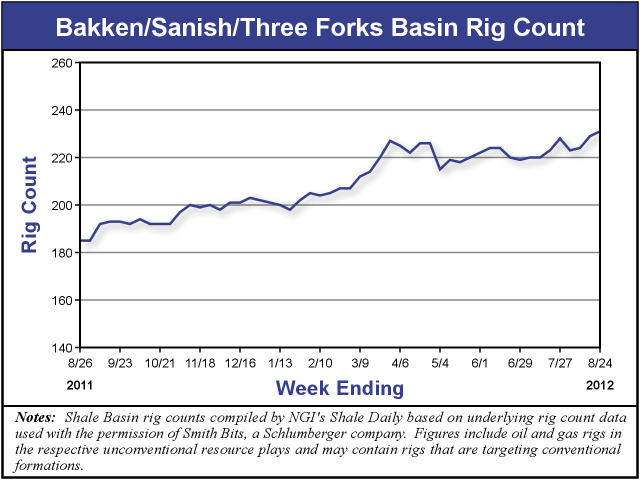NGI Archives | NGI All News Access
Bakken Oil Producers Get New Rail Terminal Option
Supply chain solutions company Savage has completed a terminal near Trenton, ND, with direct connection to BNSF Railway’s main line track, to gather crude oil from the Williston Basin and Bakken Shale and facilitate its transport to refinery markets.

The terminal provides the oil industry with inbound gathering access through truck receiving stations, pipeline connections and crude oil tankage. Outbound delivery of crude oil is served by a double-loop track capable of holding two 118-car unit trains.
“Savage recognized the need for crude transportation services in the Williston Basin and responded with the construction of our Trenton terminal,” said Nathan Savage, senior vice president of business development. “The terminal adds crude-by-rail transportation to the area’s existing pipeline capacity to maximize the options producers have to get crude to refineries.”
In mid-August, RBN Energy LLC analyst Sandy Fielden wrote that crude oil prices at Clearbrook, MN, and Guernsey, WY, had, for the second time this year, closed the gap between the Bakken and West Texas Intermediate prices. “Bakken prices are up, and there is a simple explanation why. New rail terminals — both in the Bakken and at refining centers on the East and Gulf Coasts,” Fielden wrote in an Aug. 15 blog post. In May, RBN principal Rusty Braziel wrote about the economics of moving Bakken crude by rail in another blog post.
Also in August, Continental Resources Inc. CEO Harold Hamm tipped his hat to the role expanding transport infrastructure, including rail facilities, is playing in helping producers realize the “intrinsic value of the Bakken barrel” (see Shale Daily, Aug. 10).
The Savage terminal has been transloading crude from truck to rail on a manifest basis since December. Now with the construction complete, the terminal has the capacity to handle unit trains and will operate 24 hours per day. The Savage Bakken Petroleum Services Hub is served by BNSF, which enables the flexibility to deliver crude to East Coast, West Coast and Gulf Coast markets, Savage said.
“Rail provides a more flexible, long-term, economical option to ship crude oil to destination markets throughout the East, West and Gulf coasts and along the Mississippi River,” said Dave Garin, BNSF group vice president for industrial products.
Expansion of trackage and capacity at the terminal is being planned by Savage. The terminal may grow to accommodate continued expansion of activity in the Williston Basin and the increasing need for oilfield material and crude oil receiving and handling.
According to NGI’s Shale Daily Unconventional Rig Count, drilling activity in the Bakken/Sanish/Three Forks is up by 25% from a year ago with 231 rigs running as of Aug. 24.
© 2024 Natural Gas Intelligence. All rights reserved.
ISSN © 2577-9877 | ISSN © 2158-8023 |

